| Listing 1 - 10 of 15 | << page >> |
Sort by
|
Book
ISBN: 9789089771339 9089771336 Year: 2010 Volume: 3 Publisher: Heule UGA
Abstract | Keywords | Export | Availability | Bookmark
 Loading...
Loading...Choose an application
- Reference Manager
- EndNote
- RefWorks (Direct export to RefWorks)
1. Stamcellen - 2.Noodzaak aan reglementering - 3. Historiek bij de wet 19 december 008 - 4. RL 2004/23/EG van 31 maart 2004 - 5. Privé- of publieke navelstrengbloedbanken, autoloog of allogeen gebruik van stamcellen - 6. Omzetting richtiljn 2004/23/EG - 7. Overzicht van de wet van 19 december 2008 - 8. Artikelsgewijze toelichting - 9. Slotbepalingen Het gebruik van menselijke weefsels, (stam)cellen en ander lichaamsmateriaal is een sterk groeiende sector van de geneeskunde, waarin grote kansen voor de behandeling van tot dusverre ongeneeslijke ziekten liggen. De kwaliteit en veiligheid van deze stoffen moeten gewaarborgd zijn, met name om de overdracht van ziekten te voorkomen. Om de volksgezondheid te beschermen en de overdracht van infectieziekten door deze weefsels en cellen te vermijden, moeten bij het doneren, verkrijgen, testen, bewerken, bewaren, distribueren en gebruiken van alle veiligheidsmaatregelen worden genomen. De wet van 19 december 2008 inzake het verkrijgen en het gebruik van menselijk lichaamsmateriaal met het oog op de geneeskundige toepassing op de mens of het wetenschappelijk onderzoek, behelst meer dan een omzetting van een Europese Richtlijn. De problematiek van de stamcellen komt ter sprake, alsook deze van de 'navelstrengbloedbanken' en het evenwicht tussen privé- en publiek initiatief in deze sector. Verder heeft de wetgever een werkbaar kader geschetst voor wetenschappelijk onderzoek ter zake.
Medical law --- Professional ethics. Deontology --- Belgium --- Medical laws and legislation --- Bioethics --- Human experimentation in medicine --- Médecine --- Bioéthique --- Expérimentation humaine en médecine --- Law and legislation --- Droit --- 601.7 --- medische ethiek (gez) --- stamcelonderzoek --- Wet van 19 december 2008 inzake het verkrijgen en het gebruik van menselijk lichaamsmateriaal met het oog op de geneeskundige toepassing op de mens of het wetenschappelijk onderzoek --- biobank (bank voor menselijk lichaamsmateriaal) --- stamcel (volwassen stamcel, foetale stamcel, embryonale stamcel, germinale stamcel, somatische stamcel, hematopoïetische stamcel) --- Gezondheidsrecht --- Stamcellen --- Loi du19 décembre 2008 relative à l'obtention et à l'utilisation de matériel corporel humain destiné à des applications médicales humaines ou à des fins de recherche scientifique --- biobanque (banque de matériel corporel humain) --- cellule souche (cellule souche adulte, cellule souche foetale, cellule souche embryonnaire, cellule souche germinale, cellule souche somatique, cellule souche hématopoïétique) --- Médecine --- Bioéthique --- Expérimentation humaine en médecine --- Provincie West-Vlaanderen --- Droit médical --- Belgique
Book
ISBN: 273811007X 9782738110077 Year: 2001 Publisher: Paris Odile Jacob
Abstract | Keywords | Export | Availability | Bookmark
 Loading...
Loading...Choose an application
- Reference Manager
- EndNote
- RefWorks (Direct export to RefWorks)
Bioethics --- biobank (bank voor menselijk lichaamsmateriaal) --- biogeneeskunde --- biologie(biologische aspecten) --- ethiek (ethische aspecten) --- genetica (genen) --- lichaamsmateriaal (lichaam, menselijk lichaamsmateriaal) --- patent (octrooi, patentrecht, octrooirecht, biopatent) --- recht (wetgeving, rechtspraak, rechtsbeginselen, juridische aspecten, aansprakelijkheid) --- stamcelonderzoek --- stamcel (volwassen stamcel, foetale stamcel, embryonale stamcel, germinale stamcel, somatische stamcel, hematopoïetische stamcel) --- Biotechnologie --- Celbiologie --- Genetica --- Gezondheidsrecht --- Medische ethiek --- Medisch onderzoek --- Therapie --- biobanque (banque de matériel corporel humain) --- biomédecine --- biologie(aspects biologiques) --- ethique (aspects ethiques) --- génétique (gènes) --- matériel corporel humain, (corps humain) --- brevet (brevetabilité, brevetabilité biologique, droit de brevet, droit des brevets, brevetabilité du vivant) --- droit (aspects juridiques, législation, jurisprudence, principes de droit, responsabilité) --- recherche sur des cellules souches --- cellule souche (cellule souche adulte, cellule souche foetale, cellule souche embryonnaire, cellule souche germinale, cellule souche somatique, cellule souche hématopoïétique) --- Biotechnologies --- Biologie de la cellule --- Génétique --- Droit sanitaire --- Ethique médicale --- Recherche médicale --- Thérapeutique --- #gsdb5
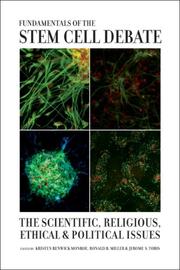
ISBN: 9780520252127 9780520252103 0520252101 0520252128 Year: 2008 Publisher: Berkeley University of California press
Abstract | Keywords | Export | Availability | Bookmark
 Loading...
Loading...Choose an application
- Reference Manager
- EndNote
- RefWorks (Direct export to RefWorks)
Few recent advances in science have generated as much excitement and controversy as the use of human embryonic stem cells. The potential of these cells to replace diseased or damaged cells in virtually every type of tissue of the body heralds the advent of an extraordinary new field of medicine. Controversy arises, however, because current techniques required to harvest stem cells involve the destruction of the human blastocysts. This evenhanded, lucidly written volume is an essential tool for understanding the complex issues - scientific, religious, ethical, and political - that currently fuel public debate about stem cell research. One of the few books to provide a comprehensive overview for a wide audience, the volume brings together leading scientists, ethicists, political scientists, and doctors to explain this new scientific development and explore its ramifications.
embryonale stamcel (menselijke embryonale stamcel, totipotent, pluripotent) --- stamcelonderzoek --- ethiek (ethische aspecten) --- cellule souche embryonnaire (cellule souche embryonnaire humaine) --- recherche sur des cellules souches --- ethique (aspects ethiques) --- Embryonic stem cells --- Embryonic Stem Cells --- Biomedical Research --- Human Experimentation --- Public Policy --- Research --- Moral and ethical aspects --- Political aspects --- Religious aspects. --- ethics --- Public policy --- Ethics --- Religious aspects --- Embryonal stem cells --- Stem cells --- Research&delete&
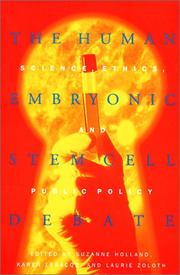
ISBN: 0262582082 Year: 2001 Publisher: Cambridge MIT press
Abstract | Keywords | Export | Availability | Bookmark
 Loading...
Loading...Choose an application
- Reference Manager
- EndNote
- RefWorks (Direct export to RefWorks)
Human embryonic stem cells can divide indefinitely and have the potential to develop into many types of tissue. Research on these cells is essential to one of the most intriguing medical frontiers, regenerative medicine. It also raises a host of difficult ethical issues and has sparked great public interest and controversy.This book offers a foundation for thinking about the many issues involved in human embryonic stem cell research. It considers questions about the nature of human life, the limits of intervention into human cells and tissues, and the meaning of our corporeal existence. The fact that stem cells may be derived from living embryos that are destroyed in the process or from aborted fetuses ties the discussion of stem cell research to the ongoing debates on abortion. In addition to these issues, the essays in the book touch on broader questions such as who should approve controversial research and what constitutes human dignity, respect, and justice.The book contains contributions from the Ethics Advisory Board of the Geron Coroporation; excerpts from expert testimony given before the National Bioethics Advisory Commission, which helped shape recent National Institutes of Health policy; and original analytical essays on the implications of this research. Leading philosophers, ethicists, scientists, and religious scholars provide a foundation for thinking about the new and controversial field of human embryonic stem cell research.
Human embryo --- Stem cells --- Research --- Moral and ethical aspects. --- embryonale stamcel (menselijke embryonale stamcel, totipotent, pluripotent) --- cellule souche embryonnaire (cellule souche embryonnaire humaine) --- Colony-forming units (Cells) --- Mother cells --- Progenitor cells --- Embryo, Human --- Research&delete& --- Moral and ethical aspects --- Cells --- Embryology, Human
Book
ISBN: 9085710367 9789085710363 Year: 2006 Publisher: Diemen Veen Magazines
Abstract | Keywords | Export | Availability | Bookmark
 Loading...
Loading...Choose an application
- Reference Manager
- EndNote
- RefWorks (Direct export to RefWorks)
Stamcellen zijn ongedifferentieerde cellen, oftewel cellen die nog geen specifieke functie hebben. Ze kunnen bijvoorbeeld uit navelstrengbloed worden gehaald. Wetenschappers zoeken methoden om deze cellen in te zetten bij het repareren van schade aan organen. De ontwikkelingen rond stamcellen wekken hoge - soms al te hoge - verwachtingen, bijvoorbeeld bij de strijd tegen Parkinson, verschillende vormen van suikerziekte en hartinfarcten. Toch zijn er nog grote hindernissen te nemen. Nog lang niet alles is bekend over de manier waarop stamcellen hun functie krijgen (en dus overgaan tot gewonen lichaamscellen). Ook loopt men bij therapeutische toepassingen nog aan tegen afstotingsverschijnselen. Dit boek gaat uitgebreid in op de mogelijkheden en beperkingen van het toepassen van stamcellen.
stamceltransplantatie --- Human genetics --- Clinical chemistry --- embryologie (geneeskunde) --- Human medicine --- Stamcelonderzoek --- 575 --- 577.21 --- 001 wetenschap --- 57 biologie --- 573.2 --- biologie --- embryodonatie --- embryologie --- hartfalen --- klonen --- navelstrengbloed --- stamcellen --- 57 --- 576.4 --- Cytologie (celleer) --- Stamcellen --- Stamceltransplantatie --- Cytologie --- 576.3 --- Celbiologie --- 577.21 Molecular mechanism of coding, storage and realization of inheritance information. Molecular genetics. Molecular biology of the gene --- Molecular mechanism of coding, storage and realization of inheritance information. Molecular genetics. Molecular biology of the gene --- 575 General genetics. General cytogenetics. Immunogenetics. Evolution. Speciation. Phylogeny --- General genetics. General cytogenetics. Immunogenetics. Evolution. Speciation. Phylogeny --- Cel- en weefselleer --- Stamcel --- Embryologie --- Geneeskunde --- stamcel --- Parkinson-zizkte --- Provincie West-Vlaanderen --- Parkinson-ziekte --- Beroep --- Hulpverlening --- Verpleegkunde
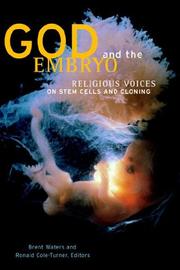
ISBN: 087840998X Year: 2003 Publisher: Washington, D.C. Georgetown University Press
Abstract | Keywords | Export | Availability | Bookmark
 Loading...
Loading...Choose an application
- Reference Manager
- EndNote
- RefWorks (Direct export to RefWorks)
Discussions and debates over the medical use of stem cells and cloning have always had a religious component. But there are many different religious voices. Contributors reflect the spectrum of Christian responses, from liberal Protestant to evangelical to Roman Catholic as well as Jewish perspectives. In addition to the deliberations found here, God and the Embryo includes a series of official statements on the issues from religious bodies. "Human Cloning and Human Dignity: An Ethical Inquiry," from the statement of the President's Council on Bioethics, concludes the book. The disputations will continue, but for anyone interested in the nuances of and religious perspectives that make their important contributions to these ethically challenging and important dialectics, God and the Embryo is an invaluable resource.
Medical law --- Christian moral theology --- Professional ethics. Deontology --- #GBIB:CBMER --- stamcelonderzoek --- embryonale stamcel (menselijke embryonale stamcel, totipotent, pluripotent) --- embryo-onderzoek (experiment op embryo's, onderzoek op embryo's in vitro) --- embryostatuut (moreel statuut van het embryo, juridisch statuut van het embryo, potentiële persoon) --- godsdienst (religie, religieuze aspecten) --- recherche sur des cellules souches --- cellule souche embryonnaire (cellule souche embryonnaire humaine) --- recherche sur l'embryon (expérimentation sur l'embryon, recherche sur les embryons in vitro) --- statut de l'embryon (statut moral de l'embryon, statut juridique de l'embryon, personne potentielle) --- religion (aspects religieux) --- Embryonic stem cells --- Human cloning --- Research --- Religious aspects. --- Embryonal stem cells --- Stem cells --- Research&delete& --- Religious aspects
Book
ISBN: 2738009905 2855988047 9782738009906 Year: 2002 Publisher: Paris: INRA,
Abstract | Keywords | Export | Availability | Bookmark
 Loading...
Loading...Choose an application
- Reference Manager
- EndNote
- RefWorks (Direct export to RefWorks)
Philosophes, journalistes, politiques, théologiens, juristes, médecins, biologistes, psychanalystes, tous parlent de l'embryon... Mais qu'est-ce vraiment que l'embryon ? Rassemblant plus de 70 scientifiques de renommée internationale, spécialistes de la biologie du développement, des biotechnologies humaines et animales, de la physiologie et de l'immunologie de la grossesse, de la génétique et de la médecine de la reproduction, cet ouvrage présente une synthèse des connaissances actuelles sur l'embryon humain et animal. Les thèmes abordés - clonage embryonnaire et somatique, transgenèse, thérapie cellulaire, diagnostic génétique pré-implantatoire, développement et évolution, génétique et épigénétique... - donneront aux lecteurs, dans un langage accessible à tous, des éléments de réponse aux questions que font naître la biologie et la médecine d'aujourd'hui.
Animal --- animals --- men --- Transfert embryonnaire --- Embryo transfer --- Reproduction sexuée --- Sexual reproduction --- Fertilité --- Fertility --- Trouble de la reproduction --- Reproductive disorders --- Génie génétique --- genetic engineering --- Hérédité --- genetic inheritance --- Maladie de l'homme --- Human diseases --- Thérapeutique --- therapy --- Développement embryonnaire --- Embryonic development --- Immunologie --- Immunology --- Activité enzymatique --- Enzyme activity --- Hormone --- Hormones --- Clonage --- cloning --- Ethics --- embryo --- ontwikkelingsbiologie --- embryonale stamcel (menselijke embryonale stamcel, totipotent, pluripotent) --- kloneren (klonen, therapeutisch kloneren) --- celtherapie --- zwangerschap --- fysiologie (fysiologische benadering) --- in-vitrofertilisatie (bevruchting in vitro, proefbuisbaby's) --- pre-implantatie genetische diagnose (PGD) --- embryon --- biologie du développement --- cellule souche embryonnaire (cellule souche embryonnaire humaine) --- clonage (clonage thérapeutique) --- thérapie cellulaire --- grossesse --- physiologie (approche physiologique --- fécondation in vitro (fertilisation in vitro, FIV, fécondation in vitro et embryo transfert, FIVETE) --- diagnostique génétique pré-implantatoire (DPI, diagnostic préimplantatoire) --- Enbryon animal --- Therapie cellulaire
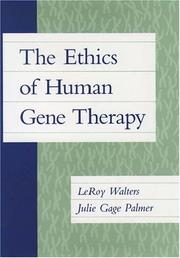
ISBN: 0195059557 9780195059557 Year: 1997 Publisher: New York Oxford university press
Abstract | Keywords | Export | Availability | Bookmark
 Loading...
Loading...Choose an application
- Reference Manager
- EndNote
- RefWorks (Direct export to RefWorks)
The authors of this absorbing new book describe the science of gene therapy in terms easily accessible to the non-specialist, and focus on the controversial ethical and public policy issues surrounding human interventions in human heredity. After a brief survey of the structure and functions of DNA, genes, and cells, Walters and Palmer discuss three major types of potential genetic intervention: somatic cell gene therapy, germ line gene therapy, and genetic enhancements. They start with the current techniques of gene addition, using non-reproductive (somatic) cells in an effort to cure or treat disease. Next they address the technical problems and moral issues facing attempts to prevent disease through genetically modifying early human embryos or sperm and egg cells. These changes would be passed on to future generations. Chapter 4, in many ways the most original part of this volume, confronts the issue of employing genetic means to improve human abilities and appearance. Depending on the technique, such enhancements could affect not only the individuals receiving the intervention but their offspring as well. Three types of genetic enhancements are considered: physical alterations to improve size, reduce the need for sleep, and decelerate aging; intellectual enhancements of memory and general cognitive ability; and moral enhancements for control of violently aggressive behavior. The authors maintain that genetic modifications should be evaluated individually rather than be condemned in principle or as a group. The final chapter summarizes the public review process that human gene therapy proposals have been undergoing in the United States since 1990. Five appendices, providing technical background information along with a complete list of questions raised in the national public review process, supplement the discussion.
Professional ethics. Deontology --- Human medicine --- #GBIB:CBMER --- gentherapie --- verbetergeneeskunde (mensverbetering) --- genetische engineering (manipulatie, gentechnologie) --- somatische gentherapie --- kiemcel (kiemcellijn, embryonale kiemcel, germinale stamcel) --- thérapie génique --- médecine de l'amélioration (médecine d'amélioration) --- génie génétique (ingénierie, manipulation génétique) --- thérapie génique somatique --- cellule germinale (lignée germinale, cellule embryonnaire germinale, cellule souche germinale) --- Gene therapy --- Moral and ethical aspects. --- Moral and ethical aspects --- Therapy, Gene --- Genetic engineering --- Therapeutics --- Gene therapy - Moral and ethical aspects
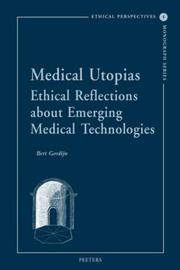
ISBN: 9042917008 9789042917002 Year: 2006 Volume: 4 Publisher: Leuven Peeters
Abstract | Keywords | Export | Availability | Bookmark
 Loading...
Loading...Choose an application
- Reference Manager
- EndNote
- RefWorks (Direct export to RefWorks)
The field of medicine is generally greeted with great enthusiasm. This can be witnessed in the immense support for medical progress, which is widely hoped to lead to a realization of idealized goals. Indeed, with the help of medicine the human body would be controllable and constructible, human nature perfectible. However, enthusiasm in favor of medical progress is first and foremost a sentiment and, like all sentiments, not necessarily a product of rational contemplation. People are capable of enthusing about the realization of utopian notions, such as life without disease or with the perfect body, without requiring any concrete arguments to back them up. Enthusiasm alone is not a guarantee of ethical desirability, however. Hence, this book takes a closer look at four research fields often referred to in medical utopian literature: 'tissue engineering', 'bioelectronics', 'germ line genome modification' and 'interventions in the biological aging process'. They serve as a basis for analyzing whether ethical arguments can be found to support the euphoric advocacy of the further development of these fields.
Ethique médicale --- Medische ethiek --- Medical ethics --- Bioethics --- Utopias --- verbetergeneeskunde (mensverbetering) --- transhumanisme (cyborg) --- posthumanisme --- biomedische technologie --- lichaamsmateriaal (lichaam, menselijk lichaamsmateriaal) --- bionica (bio-elektronica) --- kiemcel (kiemcellijn, embryonale kiemcel, germinale stamcel) --- germinale gentherapie --- veroudering (verouderingsproces) --- médecine de l'amélioration (médecine d'amélioration) --- transhumanisme --- technologie biomédicale --- matériel corporel humain, (corps humain) --- bionique (bioélektronique) --- cellule germinale (lignée germinale, cellule embryonnaire germinale, cellule souche germinale) --- thérapie génique germinale --- vieillissement --- Ideal states --- States, Ideal --- Utopian literature --- Political science --- Socialism --- Voyages, Imaginary --- Dystopias --- Biomedical ethics --- Clinical ethics --- Ethics, Medical --- Health care ethics --- Medical care --- Medicine --- Professional ethics --- Nursing ethics --- Social medicine --- Biology --- Life sciences --- Life sciences ethics --- Science --- Moral and ethical aspects
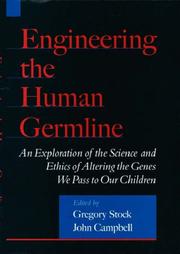
ISBN: 0195133021 9780195133028 9780195350937 0195350936 1280530766 9781280530760 9786610530762 6610530769 142940177X Year: 2000 Publisher: New York : Oxford University Press,
Abstract | Keywords | Export | Availability | Bookmark
 Loading...
Loading...Choose an application
- Reference Manager
- EndNote
- RefWorks (Direct export to RefWorks)
This book gives an overview of the potential and the practical details that need to be resolved to make human germline engineering possible. Chapters present the ethical and social concerns and implications of the fast-approaching capability to alter the human germline and take an active role in the future evolution of the species.
Genetic engineering --- Genetic engineering. --- Human cloning --- Human cloning. --- Medical genetics --- Medical genetics. --- Moral and ethical aspects. --- kiemcel (kiemcellijn, embryonale kiemcel, germinale stamcel) --- genetische engineering (manipulatie) --- ethiek (ethische aspecten) --- cellule germinale (lignée germinale, cellule embryonnaire germinale, cellule souche germinale) --- génie génétique (ingénierie, manipulation génétique) --- ethique (aspects ethiques) --- Clinical genetics --- Diseases --- Heredity of disease --- Human genetics --- Medical sciences --- Pathology --- Genetic disorders --- Human beings --- Cloning --- Human reproductive technology --- Designed genetic change --- Engineering, Genetic --- Gene splicing --- Genetic intervention --- Genetic surgery --- Genetic recombination --- Biotechnology --- Transgenic organisms --- Moral and ethical aspects --- Genetic aspects
| Listing 1 - 10 of 15 | << page >> |
Sort by
|

 Search
Search Feedback
Feedback About UniCat
About UniCat  Help
Help News
News